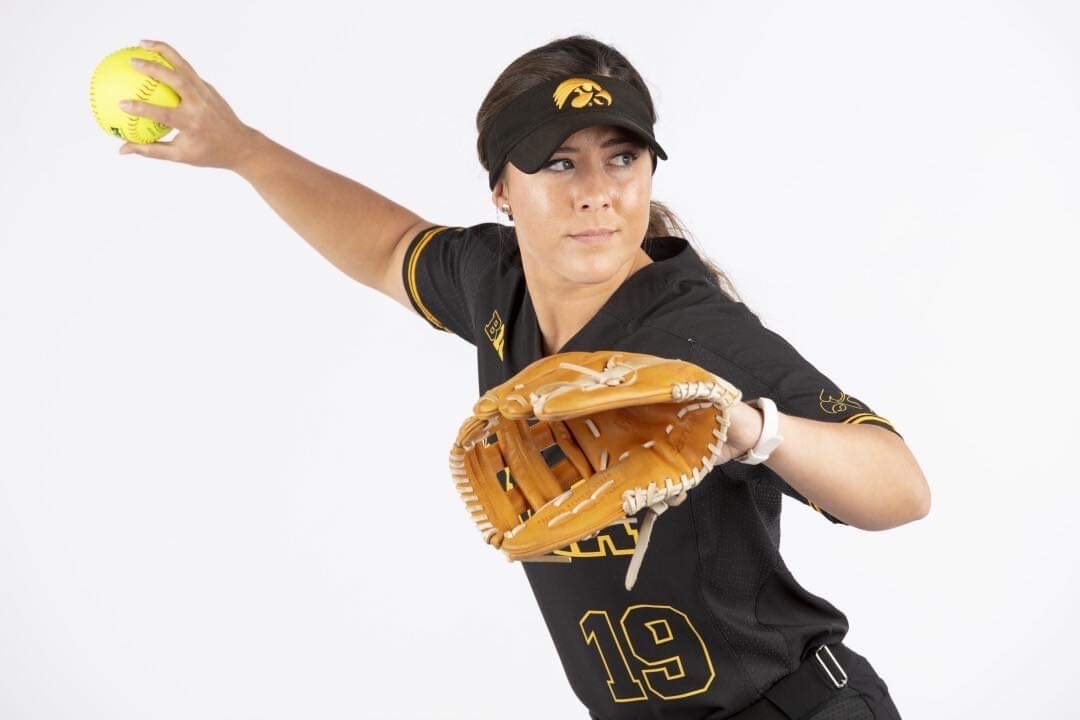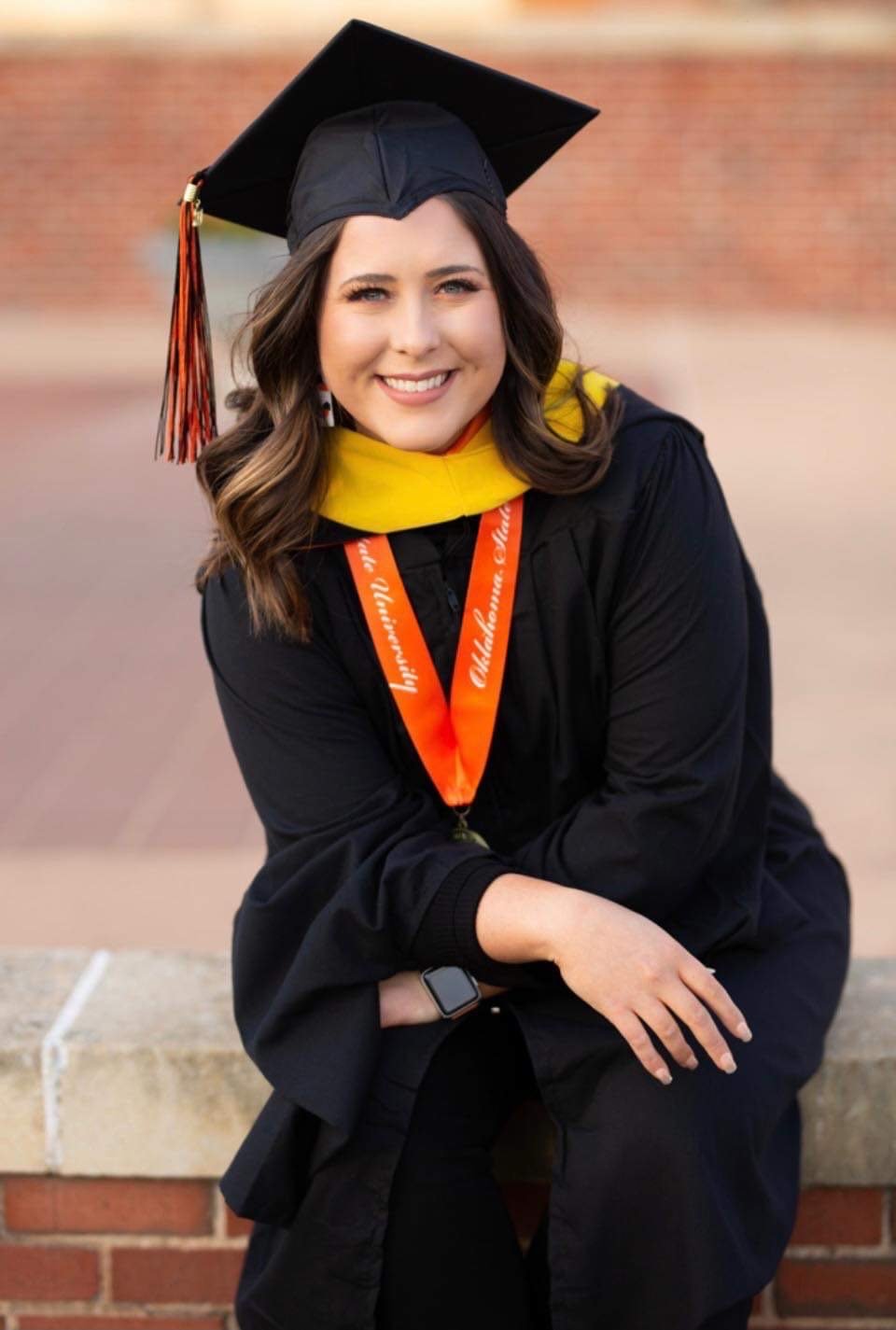Interview with softball player Liz Watkins
Liz Watkins is from Midwest City, Oklahoma and went to Carl Albert High School. She graduated from the University of Iowa in the Big 10 with a Bachelor’s in Health and Human Physiology: Health Studies in 2020. Later, she graduated from Oklahoma State University with a Master’s in Healthcare Administration in 2021. She is currently working at Stillwater Medical Center Hospital in Stillwater, Oklahoma.
Liz is happily married to her high school sweetheart Caleb Watkins and she is a new dog mom to Willow Jean Watkins. She likes being outdoors, hiking, playing catch with her husband, and playing fetch with her dog Willow.
I have written most of what we talked about below. You can listen to the full podcast HERE.
Q: When did you start playing sports?
A: At 6 years old I started to want to play when I passed a recreation league field and saw a lot of girls having fun. My parents let me start to try it out in the rec league in Tecumseh. I also did archery in middle school. The other sports I was involved with was basketball, volleyball, and track. I did softball for a long time competitively and basketball up to freshman year in high school. I got to do archery in the State competition in middle school. I competed in volleyball in middle school. Freshman year I knew I wanted to pursue softball.
Q: Do you feel like you would have done a different degree if you weren’t a student-athlete?
A: Yeah, actually I think I would have. I wanted to be a perfectionist. Ever since I was little I wanted to be a doctor. I went into college thinking I was going to be a doctor but I wasn’t ready for the disappointment. I had a hard time balancing with school and softball and sleep and nutrition and everything. If I went back in time, I would be okay with the route I ended up taking. I am thankful that God guided me the way that I ended up going. It’s okay not to end up doing the exact degree that you wanted to do.
Q: What was your experience like as a transfer student-athlete?
A: I played my freshman year at Marshall University in Conference USA. That was great but after my freshman year, all of my coaches (that I still love) ended up going to Indiana. This was a time when the portal was not available. I loved Marshall University and there are teammates and memories that I will cherish for the rest of my life. I tried to transfer to Indiana to go with my coaches there but I was blocked to go there. I was also blocked from going to any Conference USA school. This means that I was told I was not allowed to transfer to these schools. I started reaching out to colleges and I got some responses back. I committed to Iowa. It was a long and hard journey. I had those coaches for a year and then they didn’t return so I had a total of 3 sets of coaches throughout my college career. It was a very unique experience.
Q: Have you ever faced any injuries or setbacks?
A: My senior year in high school I had elbow surgery. I had a 3 centimeter bone spur in my left elbow. I had to get that removed right before going into college. My freshman year in the fall I started having severe foot pain in my right foot. I ended up having an experimental surgery to see what is wrong and it turns out I had a fragmented bone and they pulled it out in pieces. I was thankful that the doctor was able to get that out of my foot and all the symptoms were gone, it was amazing. Then comes the season and I had already been through two injuries and I ended up battling my way to a starting position as a first baseman. Fast forward to senior year at the University of Iowa. My feet pain got extremely bad in the fall semester. I ended up having bone spurs in both of my heels. I opened up to my coach about how bad it was hurting even though I was regularly seeing the athletic trainer. I saw a doctor and was diagnosed with recurring bone spurs in both of my feet. It was gut wrenching because he told me there was nothing he could do for me. I had to tell my team that unfortunately I was not able to go through with playing the season and it will affect me for the rest of my life.
Q: What was the transition out of playing competitive sports like for you? What did you do in your newfound free time?
A: If you’ve only known softball your whole life it’s hard to prepare for life after. During one of my lessons, I had a panic attack. That was a really big wake up call for me. I have been dealing with these emotions for my whole career and I finally acknowledged that there was something wrong. I reached out to my school psychologist and she connected me to resources in Oklahoma. She referred me to a psychologist counselor just to talk. I told her about everything and she recommended me to a psychiatrist. I went and they told me it was situational depression and it was a deep one but she gave me some medications and after awhile they started to work. Thankfully I was able to eventually come off of them. After that moment I realized how bad my anxiety and depression really was and it’s okay to talk to a psychologist and it’s not scary at all. It’s one of the most relaxing experiences I’ve ever had. Here we are now and I’m working at a hospital graduated with my master’s.
Q: Did you consider being a full time / team coach?
A: I didn’t think that was going to be the best fit for me. I considered it but I’m trying to find a way to love the game again and give back to the softball community. Maybe in the future but as of right now I truly want a family. Seeing what my coaches went through of making those sacrifices not only for us but for their family’s sake. Right now probably not but in the future maybe we’ll see.
Q: How did playing competitive softball shape who you are today?
A: I think it shaped me into being a very strong person mentally. I think that’s going to help me in my healthcare career because I’m giving back to those who need help. Whether it’s mental or physical, I am able to help the patients. You have patients that ask you personal questions and it’s important to be real with them. They need someone to be honest and caring so my experiences helped me be empathetic and sympathetic towards people. You’re going to see your teammates struggle, maybe the coaches struggle, at the end of the day we’re all human and it’s important to check in on people.
Q: What was one of your favorite moments while competing?
A: Freshman year we had gotten on the bus after a game and one of my teammates had sent an old picture of our coach and we started giggling. Our coach told us to get off the bus and get changed and acted like we were in huge trouble. We’re all freaking out and thinking we’re about to be in trouble. We meet in the hotel conference room and she tells us to start doing this workout. We’re thinking we’re gonna die, and then the coaches look at each other and belt out laughing. I loved that my coach was so serious about winning games but she also made us laugh.
Q: If you could go back and ask your former self or a former player a question, what would it be?
A: Are you going to be comfortable with your decisions? Is this best for your true self? At the end of the day you have to take care of yourself and you can’t try to please others. You have to focus on you.
Q: What advice would you give to someone who is recently done playing a sport?
A: It’s important to slow down and take your time. Understand that you are doing your best. You’re in a world that’s probably foreign to you a little bit. Try new things. It’s totally okay to fail forward.
Q: What advice would you give to someone who is currently playing a sport?
A: Make sure that you form connections with your teammates. Make sure everyone is heard and understood and loved. It’s important to be a light to people so others don’t feel alone. No one is going to judge you for making decisions for yourself.
If you have any more questions for Liz, please leave comments below or contact me. For more information, head to my Q & A page. If you or someone you know is struggling, please call the Suicide Hotline. It’s toll free and available 24/7 at 800-273-8255.
Once An Athlete’s mission is to provide resources and support for current and former athletes. Please support our mission by making a donation.
Are you or someone you know currently struggling with what happens in life after sports? Or did you already go through that transition to life after retiring competitive sports and wish you had more resources and support? Have you ever wondered, “what do athletes do after they are done playing sports? What’s next after sports?” Do you feel like you dedicated so much to your sport and you don’t know what to do now that you’re done competing? You’re not alone. Check out the site and join us in the journey. Once an athlete, always an athlete.
More blog posts with softball players:




